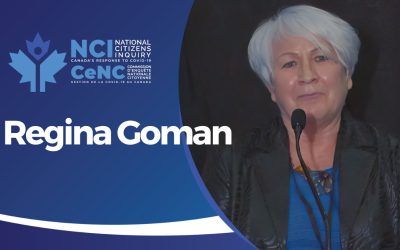Jane Jacobs took her pen to my draft and crossed out one phrase, then another. “This isn’t clear,” she said in her matter-of-fact way, writing in her revisions. “And why isn’t the post office mentioned? Or railways?”
It was 1994 and I had brought Jane a fund-raising letter for her to sign, announcing the formation of the Consumer Policy Institute, a new division of Energy Probe Research Foundation. Jane and I were among the co-founders of Energy Probe in 1980 — she would serve continuously as an Energy Probe director for almost two decades — and now we were starting a new division, one that she, especially, backed.
Jane wanted the letter to go further than I had in my draft, and to be clearer. Governments had no business running railroads, or public transit vehicles, or power companies, or the post office, she believed. In government hands, these commercial activities became evils, even “monstrous hybrids.”
Taking her pen, she inserted: “It used to be reasoned that public-service monopolies would benefit from lack of ‘wasteful’ competition and economies of scale. They don’t. The post office is a notorious example. Only when that monopoly began to break down did many badly needed innovations from independent businesses become available. Or consider long-distance passenger rail services. They are a disgrace, forever deteriorating, yet becoming more costly.”
The theme of the letter involved one of Jane’s passions: the need to separate the function of government and industry. Government has a legitimate role to play as a regulator, as a protector, as a guardian. It loses its way, and becomes prone to incompetence and corruption, when it engages in commercial activities. Then “we become triple victims as consumers, taxpayers and citizens.” Consumer Policy Institute strove to minimize victims, and to protect the environment, too, by advocating privatization, competition, economic deregulation and property rights.
Jane did not come to these free-market preferences out of any ideological adherence or by following her friends or fads; quite the opposite, those she fraternized with both socially and professionally tended to be suspicious of free markets and warm to government intervention. Jane came to her beliefs because she was, above all, practical and non-ideological: Government-owned utilities, public-private partnerships, public housing and other government intrusions into the economy stymied her desire for an entrepreneurial, inventive and diverse society. “Government needs to be independent of business to avoid conflicts of interest that prevent honest regulation or invite corruption. Good service delivery must be responsive to customers’ ever-changing needs, not protected from customers by limiting their choices or evading failure by winning government favours. Hopping the gravy train is no way to run a railroad or any other successful commercial service.”
Her passion for these issues aside, Jane had another reason for wanting the letter she was signing to be clear and forceful. She was offering donors who responded to her letter personally signed and inscribed copies of Systems of Survival, her new book. It dealt broadly with the issues raised in her letter, but far more profoundly and expansively. The book was chiefly about the two ethical systems that govern human behaviour: the Commercial Moral Syndrome, broadly ascribed to business, and the Guardian Moral Syndrome, or the rules that animate governments. Although she described both syndromes as necessary, it wasn’t hard to discern where her sympathies lay. “I used to think of government — meaning good government — as the major force at work in the civilizing process,” her book’s protagonist explains. “Now I’m inclined to think of government as being essentially barbaric — barbaric in its origins and forever susceptible to barbaric actions and aims.”
Of the 15 characteristics of the Commercial Moral Syndrome that Systems of Survival lists, none are negative. (See sidebar.) The 15 characteristics of the Guardian Moral Syndrome, in contrast, are largely repugnant. An early title for Systems of Survival that Jane considered — Raiders and Traders — provides another insight into Jane’s view of the two dominant mindsets in society. Primitive societies were often raiders — hunters and warriors who survived by force. In our time, her raiders included government and the Mafia — both territorially minded, both demanding strict loyalty to enforce discipline, both dispensers of largesse in exchange for the loyalty.
In the end, Jane chose a softer title, one less subject to pigeonholing. Governments may be raiders, but they are also more than that. Her choice of title was consistent with her approach elsewhere. She often chided me for using terms like privatization and deregulation because these had become ideologically loaded words that instantly placed people in one political camp or another. To the extent that political positions became reduced to stereotypes, such words were also one-dimensional and misleading.
Jane’s dislike of labels and ideological language helps explains a riddle that perplexes many: How could people across the political spectrum embrace her as one of their own? Especially perplexing: How could die-hard socialists embrace Jane Jacobs when, at root, she opposed most things they held dear? At Energy Probe Research Foundation, the only advocacy organization to which she steadfastly devoted her jealously treasured time, she was a self-described cheerleader in our efforts to reduce the Canadian government’s spending on foreign aid, to privatize Ontario Hydro and other Crown corporations, to deregulate the taxi industry, to pass first the free-trade deal and then NAFTA, to promote property rights. In her larger role as a writer, she opposed city planning, public housing, and regional aid, such as to farmers. In fact, she opposed redistribution in general, which she called “transactions of decline.” Her dislike of government redistribution programs led her to prefer spending on the military to welfare spending.
In part, the answer to the riddle lies in Jane’s own practical nature: In her many highly visible battles — whether saving historic buildings or stopping urban expressways — Jane fought to win, drawing allies from many corners and eschewing any ideology that might divide. By focusing on the ends that united her followers, rather than an ideological means that might divide them, she became identified with sometimes seemingly radical ends rather than means. Her willingness to defy authority, moreover, attracted her to allies on the left, as did her causes.
With Jane’s death this week, those causes, alas, are now behind her. What’s left behind are her writings: her early works on cities and planners, unquestionably her best; her later, also outstanding works on development more generally, during her Energy Probe years; her final works, in her declining years.
At the end, her writing became pessimistic, brooding and warning of catastrophe, so unlike that of her earlier years, so unlike the ethic in her Commercial Syndrome, to “Be optimistic.” It will be her earlier years that will be remembered — her devastating critiques of government planners gone wrong and her uplifting expositions on the central role of the city in civilization. This will be her legacy.
LawrenceSolomon@nextcity.com.


